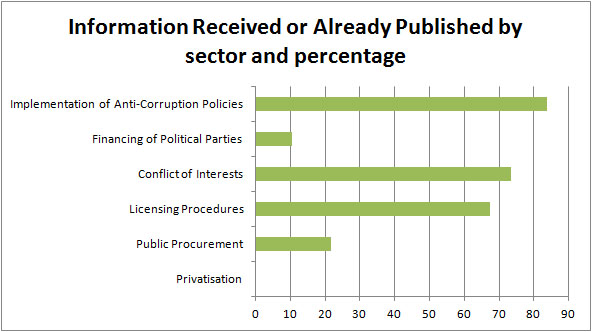Practical guide released with full results from monitoring in Croatia
Marrakesh, 25 October 2011 – A new guide on how to test levels of transparency in areas of government prone to corruption was released by Access Info Europe today, together with the results of the first large-scale monitoring conducted using the methodology in Croatia, conducted by Transparency International Croatia.
The “Anti-Corruption Transparency Monitoring Methodology” was presented today at the UN Conference of States Parties to the United Nations Convention Against Corruption currently taking place in Marrakesh, Morocco.
The data from Croatia, where 200 answers were received to 560 questions (35% or around one third), shows that there are areas where huge progress has been made on transparency in some areas such as anti-corruption policies, conflict of interest, and licensing procedures.
Corruption-prone areas still closed to public scrutiny included public procurement, financing of political parties, and privatisation of state assets – not one single question on privatisation, a controversial area in Croatia, was answered.
Anti-Corruption Transparency Monitoring Methodology with results from Croatia ![]()
![]()
![]()
Sasa Segrt, Executive Director of TI Croatia noted that “some of the information obtained by TI Croatia – including copies of contracts, audits, assets declarations, minutes, impact assessments, licences and many other documents that are fundamental to the fight against corruption – was released without problems showing that in some areas of public activity transparency is becoming the norm and the positive impact of the 2003 access to information law.”
“With the data from this monitoring TI Croatia is able to identify where there is a need to do further work to promote transparency. The data will also be useful to journalists and investigators conducting research in the field of corruption,” concluded Segrt.
The Anti-Corruption Transparency Monitoring Methodology outlines the classes of information that should be available for any public decision making process or project, as well as defining detailed classes of information that requestors can ask for in six corruption-prone areas, namely; privatization processes, public procurement, licensing procedures, wealth and potential conflict of interest of public officers, financing of political parties, and the implementation of anti-corruption policies by administrative bodies, police and prosecution.
“Information is fundamental to the fight against corruption – where there is secrecy, corruption flourishes,” commented Helen Darbishire, Executive Director of Access Info Europe.
“The Anti-Corruption Transparency Monitoring Methodology helps demonstrate where information which governments should be making available – including through obligations under international treaties such as the UNCAC – is in fact not accessible. It helps CSOs target advocacy and research,” added Darbishire.

